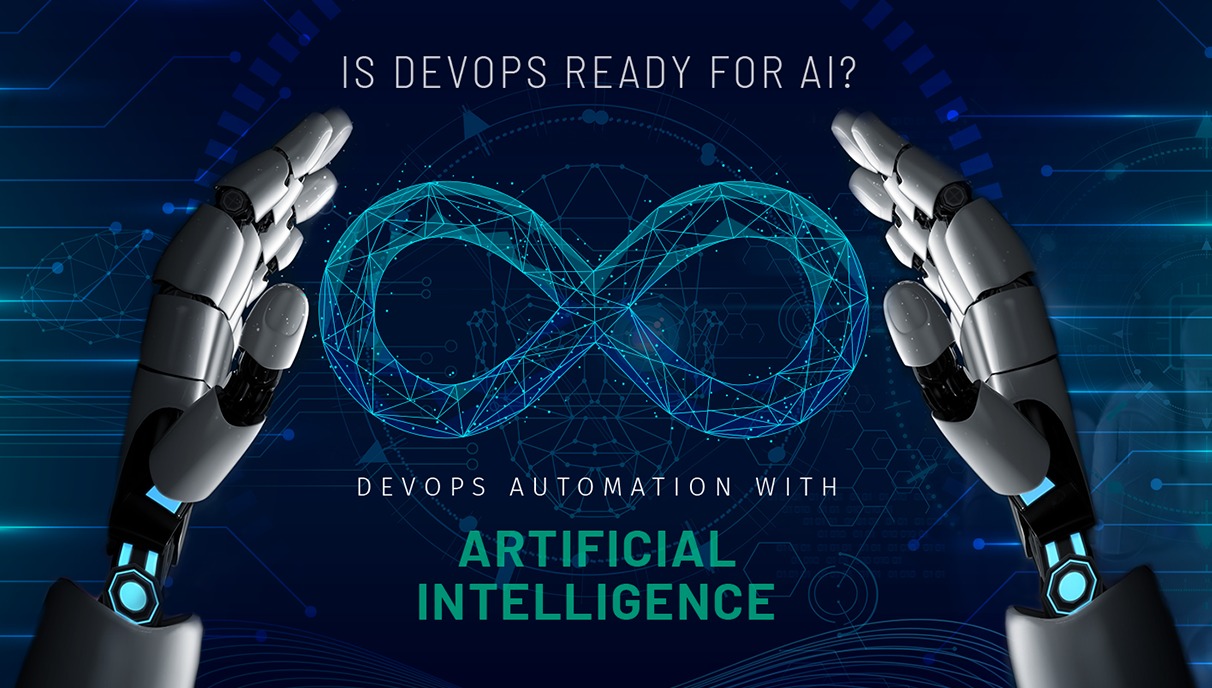DevOps Automation with Artificial Intelligence – Is DevOps Ready For AI

DevOps is the combination of two terms ‘Development’ and ‘Operations’ and deals with the automation of tasks. It asserts the automation and evaluating of all the steps of the software delivery process, making sure that every task is conducted quickly and efficiently. However, it does not neglect human responsibilities, it encourages DevOps service companies to create repeatable processes that reduce inconsistency and improve efficiency. In such a scenario, machine learning and AI are ideal fits for DevOps as they can process enormous information and help conduct tedious tasks, hence allowing the IT department to concentrate more on important and targeted work. AI can learn patterns, giving solutions, and anticipate future problems. Since the objective of DevOps is to combine operations and development, machine learning and AI can aid smoothen some of the issues that occur in DevOps. In this post, we will discuss how DevOps is ready for AI/ML.
Improved Automation
Let’s begin with the most palpable place where the inherent value proposition of DevOps and AI strikes – automation. For boosting the automation quotient in the DevOps process, AI can add substantial value by plummeting the need for human intervention across processes. Take for instance QA and testing. We are seeing an enormous bombardment of testing platforms that can speed up the QA process across unit testing, functional testing, regression testing, and user acceptance testing. These progressions all characteristically produce a wealth of data – which can enhance the accuracy of these tests as well as surface insights around obstinately poor coding practices and errors. The latter is enormously helpful in recognizing areas of development for coders and booting their performance.
Better Data Correlation across Platforms
In a broader technology ecosystem, teams use a range of development and deployment environments. Every team and their environment run into its own set of problems and errors which are taken by monitoring tools. In the absenteeism of a consistent structure for communication, there tends to be little mutual learning across these teams, implying that a lot of them go through siloed learning cycles. By getting all of the problem data into a single data lake and implementing AI, we can enhance the correlation of data from multiple platforms, hence hastening the learning cycle.
Faster Redressal of Issues
While software bugs and problems are bad for organization’s performance in general, they can be overwhelming in circumstances where the digital platform is a customer facing property. Previously, enterprises could afford to have issues logged into event management systems for days and even hours – which is not the case any longer. In the present technology-driven world, we need the ability to reveal and remediate performance issues much quicker. Here again, a combination of DevOps and AI can be a game-changer. AI can aid in arranging the most critical issues troubling the application, gather all the related diagnostic information relating to the issue and even recommend a prescriptive solution. Additionally, by observing the effect of the action taken after the issue was revealed through training data sets, the prescriptive AI systems can be even more precise with its recommendations and aid with issue remediation faster.
Better Security through Anomaly Detection
A significant and topical application of DevOps is DevSecOps – which comprises information and data security as an essential facet of software development, across the lifecycle. DDoS (Distributed Denial of Service) attacks are progressively prevalent across businesses and there is the continuously looming threat of hackers interrupting a secure system. DevSecOps can be amplified through AI to deliver utmost performance. By maintaining a centralized logging architecture to record apprehensive activity and threats and running ML-based irregularity detection techniques, developers can exactly pinpoint potential fears to their system and secure it for the future. This hands-on strategy can help alleviate the effect of DDoS and hacker attacks through a combination of DevOps and AI.
Increase Cross-Team Collaboration
This point pertains to the unavoidable cultural differences perceived across developer and operations teams. The main sticking point between the two teams, ethnically, tends to be developers’ leaning to release code fast and frequently and operations teams’ tendency towards ensuring negligeable disruption to current systems. A DevOps culture brings dual liability – reducing the time for deployment of releases – for both groups. While this fine balance can be tough to maintain primarily, AI can have a transformative effect on improving teamwork between DevOps teams. AI-powered systems can aid teams have a single, integrated view into system issues across the complicated tool-chain of DevOps and at the same time enhance the collective knowledge of differences perceived and the pathways for redressal.
Higher storage capacity
The demand for high storage capacity makes DevOps need AI and Machine learning technologies. AI and ML have a data lake that aids in the storage of data and preparation of data for usage in modeling, training, and exploration. The data lake is a distributed file system that is used to keep multi-structured data in its unique format so as to enable training, modeling, and exploration for the AI developers. Furthermore, cloud providers have made it simple for users to run machine learning workloads on their platforms. This will allow continued improvement of the DevOps as there will be no worries about data storage.
We need Artificial Intelligence to hasten the performance of DevOps. In an age where digital platforms are often the first point of communication between brands and consumers, there is a great need for allowing faster development and deployment cycles, in a way that safeguards a strong customer experience on these properties. DevOps is that framework – letting teams to code, test, release and monitor software in an organized manner. With an infusion of AI, DevOps teams can enhance automation, allow better collaboration as well as reveal and remediate key problems – therefore helping this vital framework achieve mainstream acceptance and unlock great value.